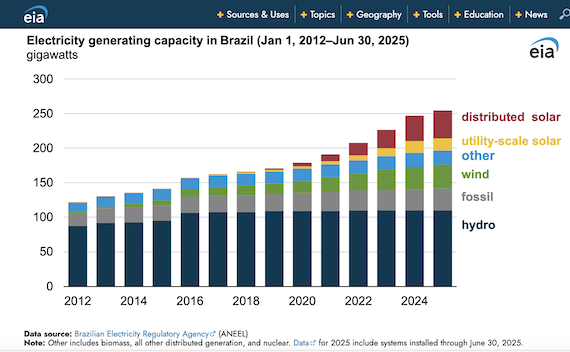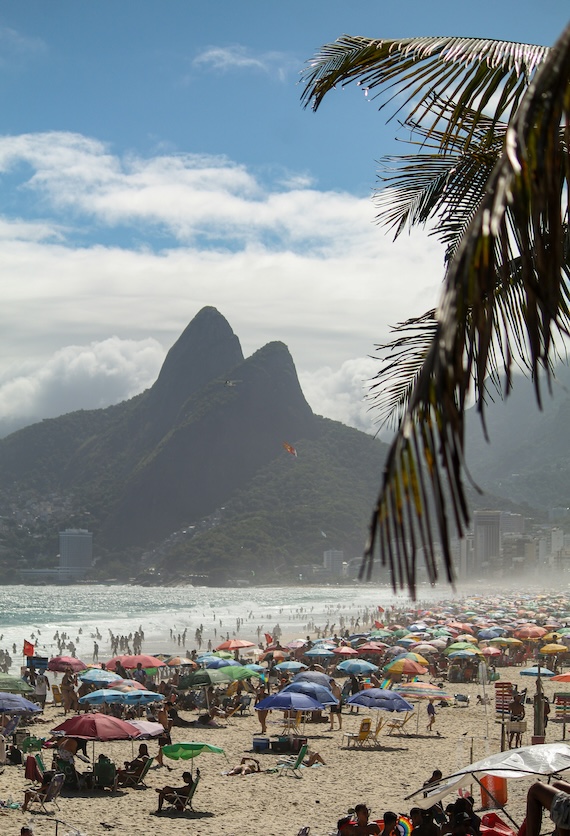Ann Arbor (Informed Comment) – This month Brazil’s National Electric System Operator estimated that wind and solar are now producing nearly 40 percent of the country’s electricity.
It was just in August of this year that the country’s wind and solar installations hit the milestone of generating over a third of the country’s electricity (some 34%), powering the equivalent of 119 million households.
Solar is now the cheapest way to generate power, coming in at only 3 cents a kilowatt hour in sunny countries like Brazil. Onshore wind can be as little as 3.7 cents per KWh. In the US in 2025, fossil gas is roughly 4.5 cents a kilowatt hour. Coal runs anywhere from 7 to 16 cents per kilowatt hour, and that’s not counting the billions of dollars in climate disasters it causes. Obviously, if you were going to put in a new electricity power plant, you’d choose solar for the purpose most places nowadays, or you might as well set your money on fire.

Juan Cole
P. O. Box 4218,
Ann Arbor, MI 48104-2548
USA
(Remember, make the checks out to “Juan Cole” or they can’t be cashed)
President Brazilian President Luiz Inácio Lula da Silva has been supportive of clean energy, though he has an “all of the above” energy policy that also supports exploration for oil and fossil gas. This year he enacted incentives for offshore wind, and Brazil is already ranked 6th in the world for onshore wind power generation. He has also issued directives to support renewables, and to expand them in the poverty-stricken Amazon region. He faces a conservative parliament that supports subsidies for fossil fuels, which for now make up a small percentage of the Brazilian grid.
Fossil fuels have fallen since 2021 from 26% to only 14% of the Brazilian electricity grid. The oil and gas interests in the United States have used the addled Trump and his rapacious myrmidons to try to stop from happening to the United States what has already happened to Brazil — a swift transition to clean and inexpensive energy, which benefits us ordinary people and not just fat cat gas CEOs.

Brazil is geographically slightly larger than the United States (Latin America and Africa are both huger than they look on our maps, which use a projection that exaggerates the size of countries in the global North). Its population, of 213 million, makes it the seventh most populous country in the world, and its over $2.1 trillion GDP ranks its economy 10th in the world. It is a country that matters, and its policies have caused wind and solar to grow by leaps and bounds.
Brazil’s past governments invested heavily in hydro-electric power, which had been dominant until recently, but has fallen to 48% of electricity generation this summer because of a severe 18-month drought. Because of the rapid installation of wind and solar, however, clean energy was able to take up the slack and Brazil avoided having to turn to dirty fossil fuels.
Never miss an issue of Informed Comment: Click here to subscribe to our email newsletter! Social media will pretend let you subscribe but then use algorithms to suppress the postings and show you their ads instead. And please, if you see an essay you like, paste it into an email and share with friends.
In 2019, wind and solar had accounted for only 12 percent of the country’s power generation, but that percentage doubled in five years to 24% in 2024. Now it has made another huge leap just in the first half of this year. Brazil is on track to be the only country to fulfill the pledge made at the 2023 COP28 in Dubai to triple its use of sustainable energy over 5 years.
Solar in particular has skyrocketed, from only 1% of the grid in 2019 to nearly 10% last year, with a further increment in 2025.
As in Australia, this incredible growth in solar came in the form of rooftop panels for homes and businesses, called “distributed solar,” rather than from big utility-scale projects of corporate solar farms. This rapid development came about because of a 2012 law implementing net metering, so that homeowners with solar panels can get reimbursed for electricity they don’t use themselves but send out on the national grid.

Photo of Ipanema by Antonio Pires on Unsplash
In fact, Brazil’s distributed solar growth has been so fast and uncontrolled that it is creating problems for the national grid, including brown-outs. Solar use in homes has a rhythm — there is a crunch, for instance, in the late afternoon and early evening when the sun is dimming but workers get home and increase their electricity use. The grid suddenly loses a big input and can become unstable. California has solved this problem with battery storage. Brazil has very little utility-scale battery storage capacity at the moment but has some 18 gigawatts in the pipeline.


 © 2026 All Rights Reserved
© 2026 All Rights Reserved